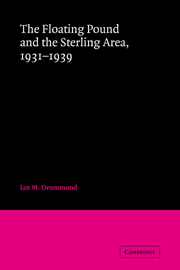Book contents
- Frontmatter
- Contents
- Preface
- 1 Introduction: the sterling area in the 1930s
- 2 Sterling and the rupee
- 3 The Canadian debate over money and exchanges, 1930–1934
- 4 South Africa, sterling, and the gold standard, 1931 and thereafter
- 5 Australia and New Zealand, 1930–1939
- 6 Monetary preparations for the World Economic Conference
- 7 United Kingdom policy at the World Monetary and Economic Conference
- 8 Talking about exchange stabilization, autumn 1933 through June 1936
- 9 The Tripartite Agreement of 1936
- 10 Intergovernmental conversations and the management of sterling, 1936–1939
- 11 Conclusion: the significance of sterling
- Notes
- Index
4 - South Africa, sterling, and the gold standard, 1931 and thereafter
Published online by Cambridge University Press: 07 October 2011
- Frontmatter
- Contents
- Preface
- 1 Introduction: the sterling area in the 1930s
- 2 Sterling and the rupee
- 3 The Canadian debate over money and exchanges, 1930–1934
- 4 South Africa, sterling, and the gold standard, 1931 and thereafter
- 5 Australia and New Zealand, 1930–1939
- 6 Monetary preparations for the World Economic Conference
- 7 United Kingdom policy at the World Monetary and Economic Conference
- 8 Talking about exchange stabilization, autumn 1933 through June 1936
- 9 The Tripartite Agreement of 1936
- 10 Intergovernmental conversations and the management of sterling, 1936–1939
- 11 Conclusion: the significance of sterling
- Notes
- Index
Summary
The confusions of 1931
When Britain left gold, South Africa did not follow at once. Its government said it would never follow. Unlike R. B. Bennett, Prime Minister J. B. M. Hertzog and Nicholaas Havenga, his finance minister, were serious in their determination to retain the gold standard. Their policies were controversial both in London and in South Africa. In October 1931 Charles te Water, the South African high commissioner in London, told his diary:
The gold standard – depreciated sterling – to remain or not to remain–this is the only topic of conversation. It has been an intensely interesting crisis. No two opinions alike. I have had long and intricate discussions with men of such divergent views as J. H. Thomas, Runciman, Sir Robert Horne, Sir H. Strakosch, Ernest Oppenheimer, and a host of others … To do what suits us best.
For fifteen months the controversy ebbed and flowed. What was best for South Africa? What, if anything, did the United Kingdom want or expect of the South African government? What pressures were applied? What arguments were marshaled by the government, and by the opposition in Parliament and outside? How was the gold standard finally abandoned, and what followed from that abandonment? Finally, why did South Africa adhere to sterling at all? These are the questions with which this chapter is concerned.
The South African debate was very public, and highly politicized. It therefore claimed the attention of the South African public in a way that the Canadian debate never managed to do.
- Type
- Chapter
- Information
- The Floating Pound and the Sterling Area1931–1939, pp. 75 - 99Publisher: Cambridge University PressPrint publication year: 1981



